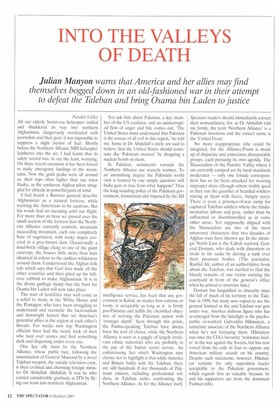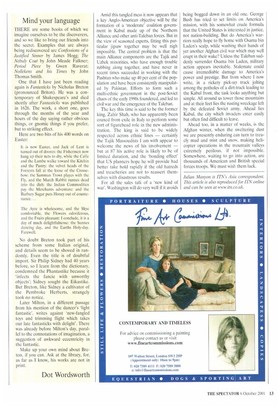INTO THE VALLEYS OF DEATH
Julian Manyon warns that America and her allies may find
themselves bogged down in an old-fashioned war in their attempt to defeat the Taleban and bring Osama bin Laden to justice
Panshir Valley AS our elderly Soviet-era helicopter rattled and shuddered its way into northern Afghanistan, dangerously overloaded with journalists and their gear, it was impossible to suppress a slight tremor of fear. Shortly before the Northern Alliance NIH helicopter lumbered into the air, I had learnt that its safety record was, to say the least, worrying. On three recent occasions it has been forced to make emergency landings in the mountains. Now the giant peaks were all around us, their tops often higher than our rotor blades, as the unshaven Afghan pilots struggled for altitude in powerful gusts of wind.
I had heard a Russian general describe Afghanistan as a natural fortress, while warning the Americans to be cautious. But his words had no meaning until our flight. For more than an hour we passed over the small section of the fortress that the Northern Alliance currently controls, mountain succeeding mountain, each one completely bare of vegetation, with rocky slopes covered in a grey-brown dust. Occasionally a mud-brick village clung to one of the giant outcrops, the houses little more than huts identical in colour to the endless wilderness around them. I understood the Afghan folk tale which says that God first made all the other countries and then piled up his leftover rubbish to make Afghanistan. It is in the divine garbage dump that the hunt for Osama bin Laden will now take place.
The start of hostilities may well come as a relief to many in the White House and the Pentagon, who have been struggling to understand and reconcile the factionalism and downright hatred that set America's potential allies in the region at each other's throats. For weeks now top Washington officials have had the weary look of men who turn over stones and find something dark and disgusting under every one.
One key ally must be the Northern Alliance, whose public face, following the assassination of General Massoud by a novel Taleban weapon, the suicide television crew, is their civilised and charming foreign minister Dr Abdullah Abdullah. It was he who earned considerable gratitude at ITN by flying our team into northern Afghanistan. Yet ask him about Pakistan, a key member of the US coalition, and an uninterrupted flow of anger and bile comes out. The United States must understand that Pakistan is the source of all evil in this region,' he told me. Some in Dr Abdullah's circle are said to believe that the United States should terminate the Pakistani menace' by dropping a nuclear bomb on them.
In Pakistan, sentiments towards the Northern Alliance are scarcely warmer. To an astonishing degree the Pakistani world view is formed by one simple question: will India gain or lose from what happens? Thus the long-standing policy of the Pakistani government, formulated and imposed by the IS!
intelligence service, has been that any government in Kabul, no matter how extreme or loony, is acceptable as long as it is firmly pro-Pakistan and fulfils the cherished objective of reviving the Pakistani nation with 'strategic depth'. Seen through this prism, the Pashtu-speaking Talehan have always been the tool of choice, while the Northern Alliance is seen as a gaggle of largely irrelevant ethnic minorities who are probably in the pay of the Indian secret service. An embarrassing fact which Washington may choose not to highlight is that while America and Britain battle with the Taleban, there are still hundreds if not thousands of Pakistani citizens, including professional soldiers, in Taleban ranks, confronting the Northern Alliance. As for the Alliance itself, Spectator readers should immediately correct their nomenclature, for, as Dr Abdullah told me firmly, the term 'Northern Alliance' is a Pakistani invention and the correct name is the 'United Front'.
No more inappropriate title could be imagined, for the Alliance/Front is made up of disparate and sometimes disreputable groups, each pursuing its own agenda. The Massoudists of the Panshir Valley where I am currently camped are by local standards moderates — only one female correspondent has so far been attacked for wearing improper dress (though others visibly quail as they run the gauntlet of bearded soldiers staring at them with fierce, hungry eyes). There is even a prisoner-of-war camp for captured Taleban soldiers where the fundamentalists labour and pray, rather than be suffocated or disembowelled as in some other areas. Yet supposedly aligned with the Massoudists are two of the most unsavoury characters that two decades of Afghan wars have thrown up. In the strategic North East is the Uzbek warlord, General Dostum, who deals with dissenters or rivals in his ranks by driving a tank over their prostrate bodies. (The journalist, Rashid Ali, author of an authoritative book about the Taleban, was startled to find the bloody remains of one victim staining the courtyard in front of the general's office when he arrived to interview him.) Dostum has languished in obscurity since the fall of much of his territory to the Taleban in 1998, but many now expect to see the general lionised as the anti-Taleban war gets under way. Another dubious figure who has re-emerged from the limelight is the psychopathic ex-warlord Gulveddin Hilunatyar, a sometime associate of the Northern Alliance when he's not betraying them. Hikmatyar was once the CIA's favourite 'resistance leader' in the war against the Soviets, but has now vowed from his exile in Iran to oppose any American military assault on his country. Despite such statements, however, Hilcmatyar remains the only opposition leader acceptable to the Pakistani government, which regards him as valuable because he and his supporters are from the dominant Pashtun tribe.
Amid this tangled mess it now appears that a key Anglo-American objective will be the formation of a 'moderate' coalition government in Kabul made up of the Northern Alliance and other anti-Taleban forces. But in the view of seasoned experts, fitting this particular jigsaw together may be well nigh impossible. The central problem is that the main Alliance components are the Tajik and Uzbek minorities, who have enough trouble rubbing along together, and have never in recent times succeeded in working with the Pashtun who make up 40 per cent of the population and have been consistently manipulated by Pakistan. Efforts to form such a multi-ethnic government in the post-Soviet chaos of the early 1990s foundered, and led to civil war and the emergence of the Taleban.
The key this time is said to be the former king, Zahir Shah, who has apparently been coaxed from exile in Italy to perform some sort of figurehead role in the new administration. The king is said to be widely respected across ethnic lines — certainly the Tajik Massoudists I am with appear to welcome the news of his involvement — but at 87 his active role is likely to be of limited duration, and the 'bonding effect' that US planners hope he will provide had better take hold rapidly if the old hatreds and treacheries are not to reassert themselves with disastrous results.
For all the sales talk of a new kind of war'. Washington will do very well if it avoids being bogged down in an old one. George Bush has tried to set limits on America's mission, with his somewhat crude formula that the United States is interested in justice, not nation-building. But do America's warriors really hope to fly home with Osarna bin Laden's scalp, while washing their hands of yet another Afghan civil war which may well erupt in their wake? Unless the Taleban suddenly surrender Osama bin Laden, military action appears inevitable. Stalemate could cause irremediable damage to America's power and prestige. But from where I now write, in a rickety pick-up truck jolting among the potholes of a dirt-track leading to the Kabul front, the task looks anything but simple. All around us tower those mountains and at their feet lies the rusting wreckage left by the defeated Soviet army. Ahead lies Kabul, the city which invaders enter easily but often find difficult to leave.
Ahead too, in a matter of weeks, is the Afghan winter, when the sweltering dust we are presently enduring can turn to treacly mud and mist and snow, making helicopter operations in the mountain valleys extremely perilous, if not impossible. Somewhere, waiting to go into action, are thousands of American and British special forces troops. We must wish them luck.
Julian Manyon is ITN's Asia correspondent. This article is also reproduced for ITN online and can be seen at WWW. itn. co. uk.



































































































 Previous page
Previous page